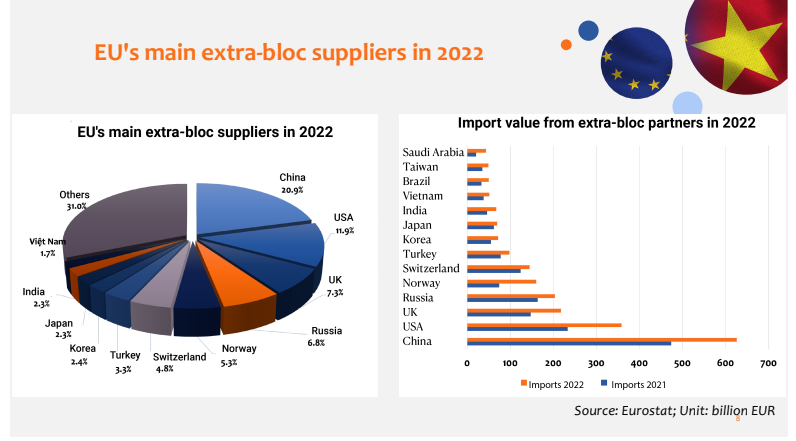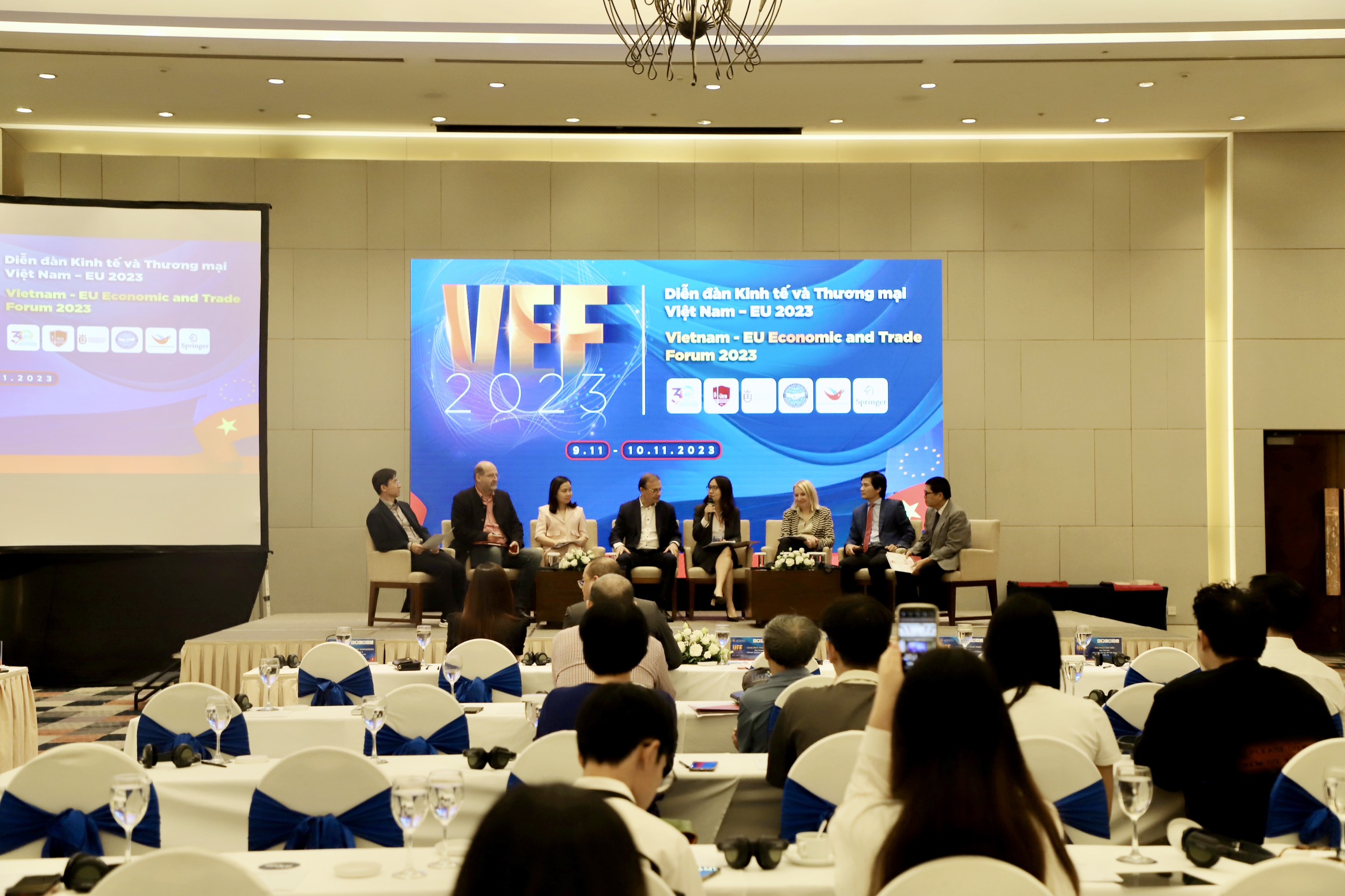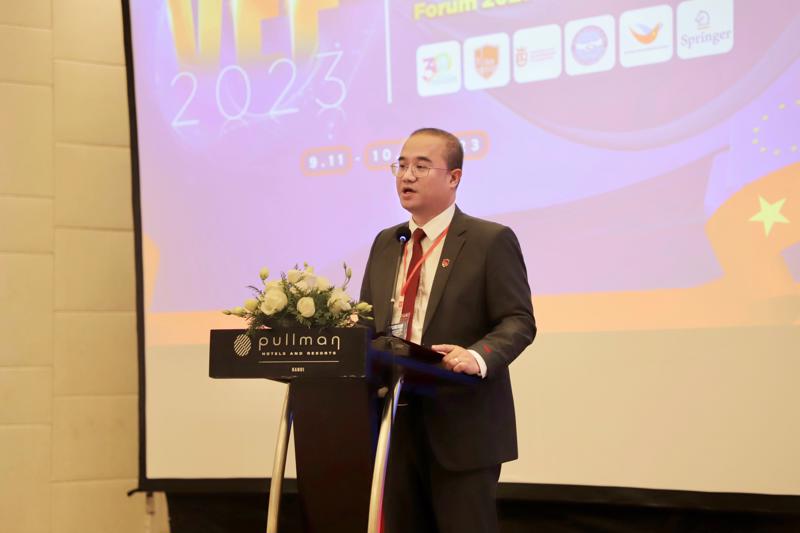The EU’s support would help Vietnam in developing a green economy and a circular economy, etc., experts told the Vietnam-EU Economic and Trade Forum 2023 (VEF2023) at the University of Economics and Business (Hanoi) (UEB), entitled “Economic Aspects of EU-Asian Relations”, organized by the UEB at the Vietnam National University (VNU) in cooperation with the Krakow University of Economics in Poland, the Vietnam Union of Friendship Organizations (VUFO), and the Vietnamese Business Association in Europe (VBAE) on November 9.
Addressing the forum, expert noted that the relationship between Europe and Asia as well between Vietnam and the EU is shaped by a range of economic, social, and environmental factors. The EU currently stands as Vietnam’s fourth-largest trading partner, following China, the US, and South Korea, and is its third-largest export market and fifth-largest import market. Meanwhile, Vietnam is the EU’s largest trading partner in ASEAN, with two-way trade reaching $62.4 billion in 2022.
EU imports from Vietnam averaged €37.07 billion ($39.56 billion) per year during the 2017-2022 period. In 2022, EU imports stood at €51.51 billion ($54.97 billion), a 33.63 per cent increase compared to 2021. Vietnam’s market share in the EU’s total extra-bloc imports in 2022 was 1.7 per cent; higher than other ASEAN countries like Malaysia, at 1.2 per cent, Thailand 0.9 per cent, Indonesia 0.8 per cent, and Singapore 0.7 per cent.
The EU is also the sixth-largest investor in Vietnam, with 2,535 active projects and total registered capital of over $29 billion as of September. “I am confident that by enhancing our bilateral cooperation, including through the robust implementation of the EUVFTA [EU-Vietnam Free Trade Agreement] and by ensuring smooth cooperation between public authorities and companies in the EU and Vietnam, we can create a greener, more prosperous future,” said Mr. Bartosz Cieleszynski, Deputy Head of the Trade Department at the Delegation of the European Union in Vietnam.

Despite facing difficulties due to the Covid-19 pandemic and supply chain disruptions, the trade and investment relationship between Vietnam and the EU has been recovering and experiencing robust growth. The mutual complementarity and increasingly close interdependence between the two sides have been strengthened, particularly since the implementation of the EUVFTA. “I am deeply convinced that an enhanced partnership between the EU and Vietnam will be instrumental in helping Vietnam achieve its ambitious goals in sustainability,” Mr. Cieleszynski added.
Awareness about the need to address the environmental and social impacts of economic development, especially in Asia, has been heightened in recent years. Vietnam and the EU have also implemented numerous cooperative projects in the areas of green transformation, digital transformation, and the circular economy, etc.
“The EU is always interested in sponsoring initiatives in sustainable development in developing countries, including Vietnam,” said Professor Nguyen Truc Le, Chairman of the UEB at the VNU. “Vietnam is considered one of the countries most heavily affected by climate change, and the experience of countries in the EU will help it in developing a green and sustainable economy, thereby promoting cooperation in other fields such as technology and education in subsequent years.”

In addition to economic cooperation, Vietnam and EU countries also cooperate in education and are increasingly witnessing good results. Mr. Alexander Nowakowski, Second Secretary at the Embassy of Poland in Vietnam, said the two countries have been strengthening cooperation in the field of education and science. “This began over 70 years ago,” he said. “And since then, thousands of Vietnamese students have graduated from Polish universities and have made impressive careers. I am therefore in no doubt that this conference will lead to the further strengthening of scientific partnerships between our countries as well as between the EU and Vietnam.”
However, there remain some barriers for Vietnam in attracting investors from the EU, such as pressure to improve the investment and business environment to meet EU requirements regarding infrastructure, human resources quality, and technology. Therefore, Ms. Nguyen Thao Hien, Deputy Director of the Department of European-American Markets at the Ministry of Industry and Trade (MoIT), suggested that the country make effective use of market opportunities and tariff advantages in the EUVFTA and promote comprehensive and balanced economic and trade relations between the two sides for mutual benefit.
“Apart from consolidating and developing market share in major markets and gateways in the region, it is necessary to expand and increase access to new markets of potential, such as Northern Europe, Eastern Europe, and Southern Europe, etc.,” Ms. Hien said. “These are small but untapped markets. At the same time, bilateral trade growth has been remarkable in recent years.”
Vietnam should also increase EU investment attraction in industries, especially manufacturing and processing, electronics, supporting industries, materials, chemicals, and pharmaceuticals, etc. “ It is also necessary to take advantage of the EU’s financial and technical assistance in cooperative programs and projects on energy, energy transition, green transition, and sustainable development in Vietnam,” she added.
Within the framework of the plenary session, the UEB introduced the book “The Economic and Political Aspect of Europe-Asia Relations” authored by Professor Nguyen Truc Le and Associate Professor Nguyen An Thinh at the UEB, and Associate Professor Ewa Ślęzak-Belowska and Associate Professor Marcin Salamaga at the Krakow University of Economics.









 Google translate
Google translate